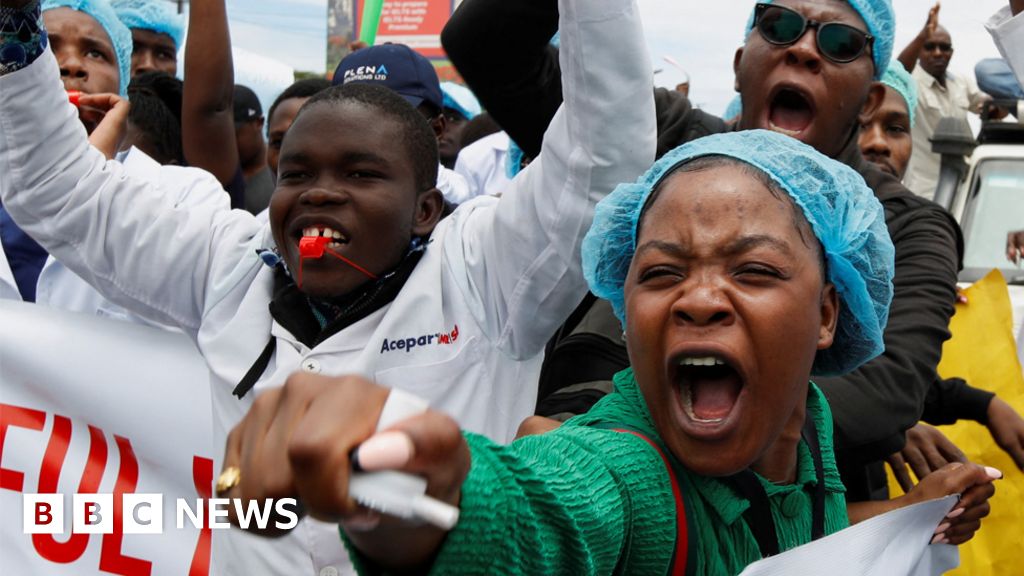- Written by Basilio Lukanga
- BBC News, Nairobi
image source, Getty Images
Most of the beds in the delivery ward at Kihara IV Hospital on the outskirts of Kenya's capital, Nairobi, are empty.
Of the dozen or so houses, only three are occupied.
The nurse said the hospital is not accepting women who need a caesarean section because they don't have a doctor who can do it.
Doctors here and across the country have been on strike for about a month.
Public hospitals are almost empty. An uneasy silence hangs over the place, which is usually crowded with people seeking essential services.
Patients are now forced to go to expensive private hospitals or delay treatment, resulting in worsening chronic conditions or even death.
Doctors are striking over a number of issues, including pay and the failure to hire trainees, who must complete a residency to qualify.
Doctors are aware of the problems the strike is causing, but working conditions and lack of equipment prevent them from properly treating patients, and in the long run industrial action is not needed “to ensure people have access to quality health care.” He said he insisted it was necessary. Secretary General of Dabji Bhimji Doctors Union KMPDU.
“Sometimes we're just there to watch for death,” he told the BBC.
image source, Getty Images
President William Ruto has called on striking doctors to return to work and agree to the government's offer, saying the country must “live according to its means”.
Many of those who have had to rely on public health services are sympathetic because they have seen the problem firsthand, but that compassion is being tested.
One woman told the BBC that her sister-in-law, who was in labor and needed surgery, lost her unborn child to the strike.
Unable to access treatment from western Kenya, the patient went to the main referral hospital in Nairobi but was turned away.
She was eventually taken to a private hospital, but it was too late to save the baby.
Lucy Bright Mbugua, 26, said her 10-month-old baby had been admitted to Nairobi's Kenyatta National Hospital since January.
Her baby is being treated for an illness that requires ongoing treatment, but only a few doctors are available. They now come about twice a week instead of every day.
“It's hard not having services. Babies are suffering and there's no medicine,” she told the BBC.
Her mother, Ann, said she often spends nights at the outpatient center to care for her daughter and save on transportation costs.
The farmer, who came to Nairobi from his rural home 200 kilometers away because his grandson became ill, says he is trying to help his daughter financially, but it is very difficult.
“Why can't they just sit down and agree,” she said of the striking doctors and government, adding, “We small fry are really suffering,” a sentiment many agree with.
Some people seek comfort in prayer.
A pastor in Kibera, one of Nairobi's biggest slums, said he sees about five sick people a week.
Pastor Stephen Genda told the BBC: “I know they need to see a doctor, but if there is no treatment, I hope they don't have any other ideas or give up hope. I will pray,” he said.
The problem is now exacerbated by the fact that clinical staff are on strike.
They provide outpatient services and form the backbone of health care, especially in rural areas. But they vowed not to move until their demands were met.
“The government is not going to give us anything without a fight,” said Peterson Wakira, president of the Kenya Union of Clinical Employees.
The government says it has paid unpaid salaries to doctors and offered to hire trainee doctors.
The proposal followed negotiations that included court-ordered consultations involving representatives from various government departments.
But the doctors rejected the offer, arguing that the salaries offered to trainees represented a significant reduction from what was agreed in the 2017 contract.
The government set the new amount at $540 a month, but the union said the agreement agreed to pay and benefits of $1,600.
Authorities have been unable to hire all future trainees, saying they do not have enough money to pay them.
This leaves many feeling bitter and unwanted.
Mysheni Mike, a postgraduate doctor waiting to be posted, told the BBC at the start of the strike that the government was “not prioritizing you or the skills you have”.
Shirley O'Garo, a dental surgeon who is also waiting for a position, said graduating was a very happy moment, “but now I'm fighting.”
“If you look at your colleagues, people who have taken other courses, they are growing well. Some are starting families. It's depressing and very frustrating,” she said. told the BBC.
The authorities are starting to take a tougher stance.
Some governors, who head county governments that perform most health functions, have threatened to fire doctors.
Msomi Nyuki, chairman of the Governor's Council Health Committee, said some of the doctors' demands were “irrational” and “difficult to implement.”
Last week, a public hospital in Nairobi announced it would fire more than 100 doctors who participated in the strike. But medical workers have so far vowed to remain on the ground.
Bhimji accused the government of not having “concerns about the services we provide. Otherwise, if we had concerns, we would sit down and discuss the issue.”
Religious figures and opposition leaders are calling on the government to restart negotiations with doctors and restart hospital operations.
But this could still drag on for months, with the 2017 outage lasting about 100 days.
But Mbugua, who has a sick 10-month-old baby, hopes the strike will end soon.
“We want the doctors back so things can be normal again,” she says.


